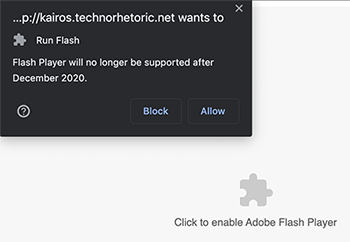Logging On
Cheryl Ball, Co-Editor
Goodbye Flash!

Y'all. This project. :/ Just writing about it makes me want to reach for a beverage. This project started almost three years ago, when I arrived at Wayne State University Libraries, and a dear and smart colleague, Kim Schroeder, who runs the Digital Media Projects Lab in the School of Information Science, suggested that the National Digital Stewardship Alliance (NDSA) student group she advises could help me think through how to archive all the Flash-based webtexts we had published over the years. Kairos knew the Flash texts would become a problem—they had already become a problem in that they were not viewable on mobile devices any longer; we just didn't know how long they would remain viewable on desktop devices. It turns out that date was January 12, 2021. Three days before publication in our 25th year.
In 2018, masters students in the NDSA chapter at WSU undertook the project to archive all of our Flash files throughout Kairos's history. There were more than we anticipated, as Doug went through the servers searching for all the .swf and .flv files we had—many of which were buried inside webtexts, used as minor navigational elements or embedded video or audio files (prior to HTML5's ability to integrate those items directly into the code). The students prioritized the texts that relied on Flash as the main component of their interfaces, such as M. Remi Yergeau, Kathryn Wozniak, and Peter Vandenberg's webtext cited in this issue, "Expanding the Space of f2f: Writing Centers and Audio-Visual-Textual Conferencing.” As you'll see if you click on that link, the text is no longer there the way it was originally intended. Instead, you get a notice that reads “This webtext was originally created in Adobe Flash, which is no longer available. In the near future, we'll be able to embed an emulator which will allow readers to experience the webtext here on the journal's site, but until that is in place, we have made available a web archive file, which can be opened and read with the WebRecorder Desktop app.” Below that are two links: one for the Web Archive (WARC) file and another for the Desktop app that you can download for your specific operating system from GitHub.
Of course, the problem with having amazing students complete work in 2018 is that, if in 2020 there is a global pandemic and you procrastinate on checking the files for two-year masters students, sometimes those files disappear and you are stuck with three days to grab all of those Flash files again, while attending full days of Modern Language Association panels that you've helped organize. And thus began the panic of the EMERGENCY FULL STOP ALL STAFF ON DECK @everyone call I put out to our Kairos slack group on Saturday, January 9, 2021. And in those three days, we are pretty sure we managed to grab everything as a WARC file—the Library of Congress standard for archiving Web-based content, which is also used for the Internet Archive. It is times like these that the Kairos staff makes me want to cry with joy. They are such a giving, supportive, collegial, get-r-done group of scholar-editors. My panic turned into staff member after staff member showing up to help go through each of the webtexts, clicking on all the internal links in every piece, and diligently capturing the interactivity that Flash afforded us for those two brief decades of time. I would like to specifically thank the following staff members, without whom Kairos would not have been able to live up to its reputation of being the digital journal with one of the best preservation records in history:
Erin Kathleen Bahl
Elkie Burnside
Christopher Andrews
Ashley Beardsley
Rick Wysocki
Elizabeth Chamberlain
Michael Faris
Douglas Eyman
And a sincere thank you to all of you who couldn't jump in but were there in spirit—there were many of you! As of midnight, on Monday, January 11 (the plug-in would be disabled by Adobe as of January 12), we grabbed over 41 webtexts that were Flash-based or Flash-infused. Senior Editor Doug Eyman is working to add all the WARC files we captured to each of the webtext index pages. As soon as a stable emulator is available for viewing in-browser, we will add that functionality. In the meantime, you can download the WARC file (make sure to right-click to download it) and the WebRecorder Desktop App, then Import the WARC file into the App, and click through the webtext as if you were viewing it on the Web. There may still be missing components that we weren't aware of at the time of capture, and we are sad at those losses, but hope that they are counted as minor in the scheme of preserving these important and often experimental texts that showcase the history of our journal and our field.

